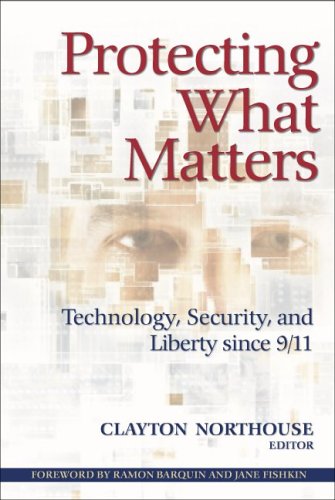

Most ebook files are in PDF format, so you can easily read them using various software such as Foxit Reader or directly on the Google Chrome browser.
Some ebook files are released by publishers in other formats such as .awz, .mobi, .epub, .fb2, etc. You may need to install specific software to read these formats on mobile/PC, such as Calibre.
Please read the tutorial at this link: https://ebookbell.com/faq
We offer FREE conversion to the popular formats you request; however, this may take some time. Therefore, right after payment, please email us, and we will try to provide the service as quickly as possible.
For some exceptional file formats or broken links (if any), please refrain from opening any disputes. Instead, email us first, and we will try to assist within a maximum of 6 hours.
EbookBell Team

4.3
68 reviews
ISBN 10: 0815761273
ISBN 13: 9780815761273
Author: Clayton Northouse
A Brookings Institution Press and the Computer Ethics Institute publication Can we safeguard our nation's security without weakening cherished liberties? And how does technology affect the potential conflict between these fundamental goals? These questions acquired renewed urgency in the wake of the 9/11 attacks. They also spurred heated debates over such controversial measures as Total Information Awareness and the USA PATRIOT Act. In this volume, leading figures from the worlds of government, public policy, and business analyze the critical issues underlying these debates. The first set of essays examines the relationship between liberty and security and explores where the public stands on how best to balance the two. In the second section, the authors focus on information technology's role in combating terrorism, as well as tools, policies, and procedures that can strengthen both security and liberty at the same time. Finally, the third part of the book takes on a series of key legal issues concerning the restrictions that should be placed on the government's power to exploit these powerful new technologies. Contributors include Zoë Baird (Markle Foundation), James Barksdale (Barksdale Group), Bruce Berkowitz (Hoover Institution), Jerry Berman (Center for Democracy and Technology), Beryl A. Howell (Stroz Friedberg), Jon Kyl (U.S. Senate), Gilman Louie (In-Q-Tel), David Luban (Georgetown University), Richard A. Posner (U.S. Court of Appeals for the Seventh Circuit), Marc Rotenberg (Electronic Privacy Information Center), James Steinberg (Brookings), Larry Thompson (Brookings), Gayle von Eckartsberg (In-Q-Tel), and Alan F. Westin (Columbia University).
Acknowledgments
Part I: Introduction: Security and Liberty in the Twenty-first Century
Providing Security and Protecting Liberty
How the Public Sees the Security-versus-Liberty Debate
Part II: Protecting Security and Liberty: Information Technology's Role
Information Technology and the New Security Challenges
Building a Trusted Information-Sharing Environment
Security and Liberty: How Technology Can Bridge the Divide
Policies and Procedures for Protecting Security and Liberty
Part III: Technology, Security, and Liberty: The Legal Framework
Communications Assistance for Law Enforcement Act: Facing the Challenge of New Technologies
Security, Privacy, and Government Access to Commerical Data
Foreign Intelligence Surveillance Act: Has the Solution Become a Problem?
Why You Should Like the PATRIOT Act
Why I Oppose the Patriot Act
Liberty and Security Timeline
Further Resources
Contributors
Index
act for human progress by protecting what matters
provision protecting what matters
axa protecting what matters
building futures and protecting what matters
britax romer protecting what matters most